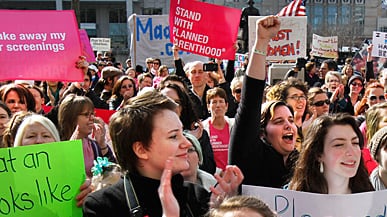Amid flashier headlines, Indiana’s decision to defund Planned Parenthood this month didn’t spark the media firestorm that it might have in a less manic news cycle. But for the thousands of women who’ll soon be forced to find a new health-care provider—and for pro-choice activists nationwide—news of the measure hit with a sickening thud.

On May 10, Gov. Mitch Daniels signed a bill that made Indiana the first state in history to cut off Medicaid funding to Planned Parenthood. The bill also bans abortion after 20 weeks and requires that Indiana women seeking abortions be read a statement advising that life begins at fertilization. Indiana State GOP Rep. Eric Turner told The Daily Beast, “I believe this will make us the most pro-life state in America.”
After a U.S. district judge denied Planned Parenthood’s request for a temporary hold on the measure, more than $50,000 in donations have poured in to the organization—enough to continue services through May 30. But when private funding runs out, the state’s 9,300 Medicaid recipients who rely on the clinics as their primary medical providers will be left in the lurch. Planned Parenthood has already filed an injunction against the state of Indiana, set to go to federal court June 6.
Among Indiana women on Medicaid and private insurance alike, the bill has sparked outrage. Ashley Plummer, 27, has relied on Planned Parenthood in Indianapolis as her primary-care provider for years—and while the Butler University new-media specialist doesn’t rely on Medicaid, she empathizes with those who do. She wasn’t shocked when she saw the defunding bill move to the Republican-controlled state senate, but believed Daniels would strike it down: “You want to look these people in the face and say, ‘Why would you do this to a woman in Indiana? What are you getting out of this’”?
Indiana’s conservatives might respond that they don’t want their tax dollars funding abortions, which Planned Parenthood performs, along with providing inexpensive Pap tests, STD screenings, HPV vaccinations, and various methods of birth control. But Medicaid funds can’t actually be used to pay for abortions, according to the federal Hyde Amendment, enacted three years after Roe v. Wade.
“I don’t want to be here anymore. I don’t want to be living in the state that sets the precedent for defunding women’s health care.”
Daniels’ office has released a statement advising that around 800 other health-care providers across the state can provide the same preventative-care services as Planned Parenthood clinics. “We don't believe that ladies will receive any less services, they just won't be provided for by those who do abortions,” Turner said.
Betty Cockrum, president and CEO of Planned Parenthood of Indiana, insists that other facilities don’t come close to providing the same care: “Does that mean they offer all the services we offer? No. Does it mean they're as convenient in terms of their patient's hours? No. Does it mean they're as conveniently located when gas is over $4 a gallon? No. Does it mean there's no wait for your next birth-control pills so that you can avoid unintended pregnancy? No.”
Nicole Robins, a 31-year-old nurse’s assistant and Planned Parenthood Medicaid patient, echoed the sentiments of other women when she said: “Ditch Mitch!”
The governor has vowed to redirect the Medicaid budget for Planned Parenthood services to the as-yet unidentified 800 clinics—but even that money may not be around for long. Ken Falk, an ACLU lawyer for Planned Parenthood’s injunction case, explained that under Indiana’s state Medicaid plan, the program’s recipients must be allowed to choose their own medical providers. Making certain providers off-limits violates this agreement, and puts Indiana at risk for losing the $4 million in federal grants they receive for their family-planning program.
With similar measures being considered in Texas, North Carolina, Oklahoma, Tennessee, and New Hampshire, as well as a less extreme version of the bill recently passed in Kansas, Daniels’ move appears to be part of a growing conservative effort to take down the organization pro-lifers call “America’s largest abortion provider.”
“I've lived in Indiana my whole life,” said Plummer. “But when you hear this bill's supporters boasting about how we're setting a precedent for the rest of the country, it makes you sick to your stomach about a state you really do love. Suddenly you think, ‘I don't want to be here anymore.’ I don't want to be living in the state that sets the precedent for defunding women’s health care.”
Louis Jordan is an intern and NewsBites reporter for The Newsweek Daily Beast Company. He is a journalism student at The New School. His writing has also been featured in POZ Magazine and New York Press. He is originally from Indiana.






